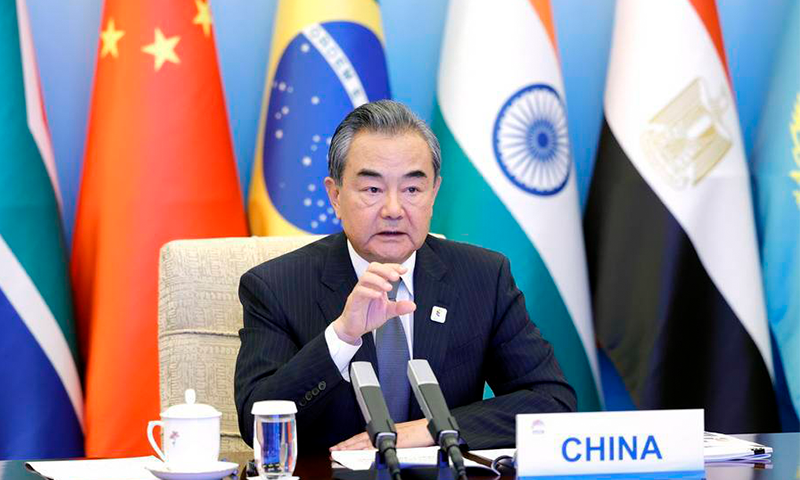
Wang Yi chairs dialogue of foreign ministers between BRICS and emerging markets and developing countries on May 19, 2022. Photo: Courtesy of Ministry of Foreign Affairs
China and India's common interests far outweigh differences and the two countries should jointly address various global challenges, and safeguard their common interests as well as interests of developing countries, said Chinese State Councilor and Foreign Minister Wang Yi against the backdrop of Western efforts to sow discord in China-India relations and weaken the joint force of new economies at the ongoing BRICS summit.
BRICS members have different histories and national realties, but all, including India, should bear the original intention that the bloc was formed to speak louder for their common interests in a world where rules are predominantly set by the West, experts said.
Wang made the remarks during his meeting with Indian Ambassador to China Pradeep Kumar Rawat on Wednesday, adding that China and India should support rather than undermine each other, strengthen cooperation rather than guard against each other, and enhance mutual trust rather than be suspicious of each other.
Wang also cited Indian External Affairs Minister Subrahmanyam Jaishankar who publicly expressed his disapproval of European centralism and objections to external forces meddling in China-India relations. "That reflects India's tradition of independence," Wang said.
Qian Feng, director of the research department at the National Strategy Institute at Tsinghua University, told the Global Times that India's unique status was underscored amid the new geopolitical realities as a major developing country as well as a nation in proximity to the West in terms of their democratic formats.
But to the West's disappointment, India is expected to continue its tradition of independence, meaning India will work with China to carry on and expand cooperation in multilateral frameworks like BRICS and disputes won't dominate relations, Qian said.
Rawat said his country will firmly pursue an independent foreign policy, and is ready to work with China to follow through on the strategic consensus reached by the leaders of the two countries, strengthen communication, properly handle differences, enhance mutual trust, and promote better development of bilateral cooperation.
Observers also noted that India should understand that wooing India to confront China — what the US has been doing — is using New Delhi as a chess piece rather than true respect.
The West cannot overcome its inherent arrogance and West-centric mindset when dealing with an ancient civilization of the East, analysts said.
According to Rawat, the two great civilizations of India and China learned from each other in history and fostered rich and beautiful cultural treasures for the two countries and the region. Over the past several decades, China has made remarkable achievements. India-China relations are among the most important relations in the world. Although having experienced twists and turns, bilateral ties are always full of opportunities.




